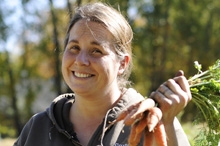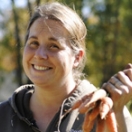

Sonia Kendrick is being honored as a Women Veteran Leaders Champion of Change.
It is an honor to have been selected as a Champion of Change. As a veteran of the war in Afghanistan, I experienced what war and food insecurity can do to a people. I came out with an understanding that whoever controls your food controls you and that our ability to feed ourselves is the root of our democratic right to rule ourselves. I also realized that food security is national security and that plows are greater than swords.
Returning to civilian life I shoved my military experience into a box under my bed. Two children and four years later the economy collapsed and I was laid off from my factory position. Unable to find a job, I decided to return to school and pursue my dreams of farming.
At this time, I believed that I could not become a farmer because I was not born into a farm family. I believed—as many Americans—believe that farming is a caste system and is accessible only to those who carried the birthright of land. I thought becoming an agronomist (Farming Scientist) was as close to farming as I could get.
While attending Iowa State University, I was told that the mantra was "Iowa Feeds the World", yet Iowa has almost 400,000 food insecure people (Feeding America). I found a great disconnect from the mantra and reality, given that Iowa was not even feeding itself.
In response, I decided to start a small, half-acre vegetable farm in order to get fresh vegetables into local food pantries. About this time the military box under my bed turned into a monster and came out in the form of PTSD. I did not understand what was happening to me and I was barely holding onto my sanity. I found that the work on the farm grounded me in that it gave me a mission and a purpose. Through God’s grace I can serve my people again in a positive way.
Like many American states, Iowa imports over 90% of its food (Leopold Center). This directly ties the cost of our food to the price of fuel. As fuel prices increase, so will the cost of our food. Without a systems change, we will have more hungry in the future.
We have a global food system that runs on fossil fuels; a volatile system, considering the population is projecte to increase to 9 billion by 2050. The threat of limited fossil fuels and climate change make it necessary to come out of the global food line and create our own food. Doing so would keep $230 million in Iowa every year (Leopold Center). The USDA says we also need 10,000 new farmers a year in order to meet growing food demands.
Food insecurity and the need to change our food system from a transportation-based food system to a locally-based food system are problems that can solve each other. I founded Feed Iowa First to confront food insecurity today by growing food and tomorrow by teaching farmers.
In my county, there are over 25,000 food insecure people (Feeding America). To feed these 25,000 people their minimum 2.5 cups of vegetables every day for one year, it will take approximately 500 acres. I did a GIS survey of three cities in my county and there are over 800 acres of underutilized land surrounding just churches. So, the land is there to solve the problem of food scarcity, it is only a matter of whether or not we take advantage of it. Currently, we are urban farming in 3 cities in my county and last year produced and donated nearly 22,000 pounds of fresh vegetables.
Sonia Kendrick is a veteran of Operation Enduring Freedom, and the founder and Executive Director of Feed Iowa First, collaborated in the creation of Women Veteran Farmer Coalition in Iowa and the secretary of Linn CO Food Systems Council. She is most importantly a mother who is concerned with the future of her children.


